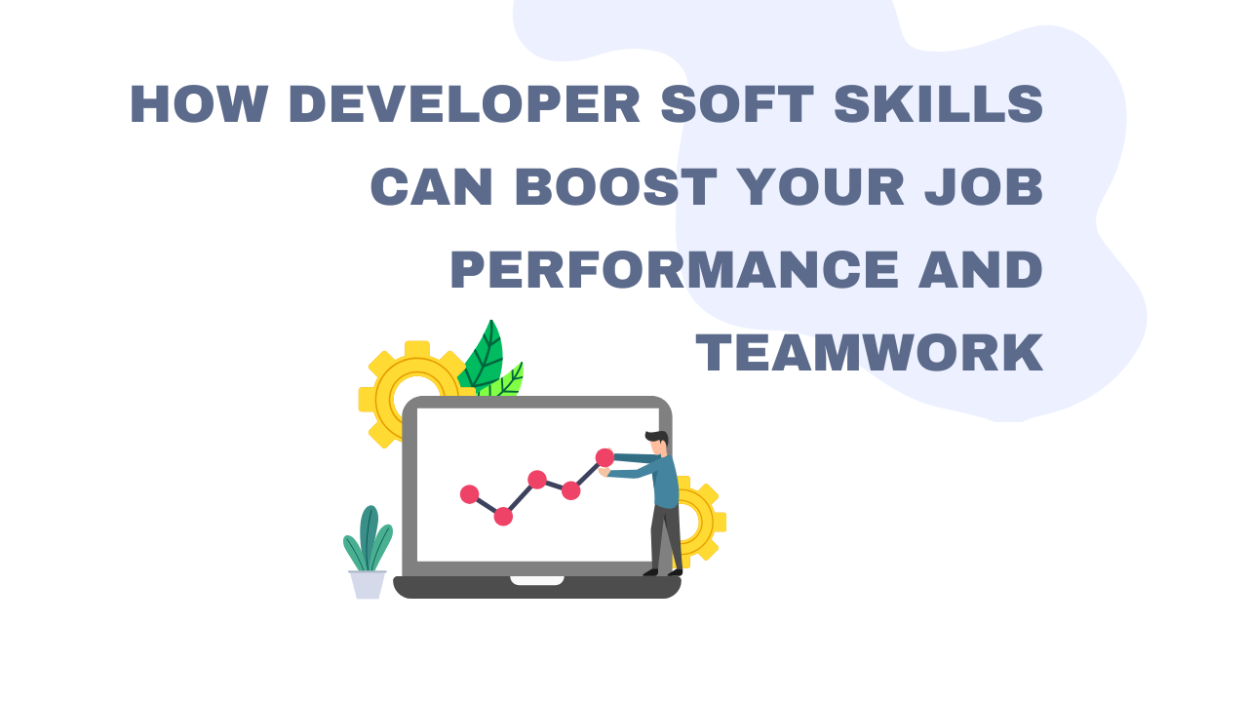Throughout my journey as both a developer and an entrepreneur, I’ve realized that being technically skilled is just one piece of the puzzle. I’ve had the privilege of working with many talented developers, and I’ve observed how some of the best developers excel not just because of their coding expertise, but because of their developer soft skills.
These soft skills have helped them thrive, adapt to new challenges, and work harmoniously with their colleagues, leading to stronger projects and better results for my company. In my own experience, it’s not enough to simply sit in front of the screen and focus on writing code.
Trust me, there’s so much more to being a successful developer. Developer soft skills are just as essential in the workplace as technical knowledge. They can significantly enhance job performance, improve teamwork, and create a collaborative and efficient environment that drives my company forward.
Let me share with you how developer soft skills have made a tangible difference in both my role as a developer and as an entrepreneur managing a team of developers. I believe these skills are what can help you and your team perform at your best and succeed in the long run.
Table of Contents
Communication – The Secret to Collaboration
If there’s one thing I’ve learned over the years, it’s that the best developers are not just those who code well. They are the ones who can communicate their ideas clearly and effectively. When I started my company, I quickly realized that great communication wasn’t just about writing clean code; it was about explaining ideas, collaborating, and ensuring everyone is on the same page.
Here’s how developer soft skills in communication can boost job performance and improve teamwork:
- Sharing Ideas Clearly: As a developer and entrepreneur, I’ve learned that when I can explain my thought process, my team gets a better understanding of the logic behind my approach. This leads to more effective collaboration and fewer misunderstandings.
- Listening Actively: The best developers are also great listeners. By actively listening to my team members’ feedback or challenges, I gain insights that help me improve not only my own work but also our collective output.
- Being Transparent: As a leader, I’ve realized the importance of transparency. If I’m struggling with a particular piece of code or facing a challenge, I openly communicate it with my team. This fosters a culture of openness and helps us solve problems together.
Teamwork – More Than Just Collaborating
As both a developer and a business owner, I’ve come to understand that being a great team player is far more important than being a solo coder. At my company, developer soft skills help my team work more efficiently and collaboratively. Here’s how improving teamwork can boost job performance:
- Supporting My Teammates: Managing a team of developers, I believe it’s essential that we help each other grow. When I actively support my teammates by solving problems or contributing to their tasks, it speeds up the project and makes everyone feel more engaged.
- Flexibility and Adaptability: Software development is constantly changing, and so are our projects. I’ve learned that adapting to new tools, tech, or requirements is crucial. My ability to be flexible and open-minded helps me and my team stay aligned, even when the project scope evolves.
- Constructive Feedback: I encourage open feedback at my company, and I’ve found that providing constructive criticism helps the team improve. It’s a vital developer soft skill that ensures we continuously grow and make better decisions moving forward.
Emotional Intelligence – Connecting with Your Team
In the early days of my career, I didn’t fully grasp the value of emotional intelligence. But as I moved into managing a team of developers, I quickly saw how essential it was. Emotional intelligence, as one of the developer soft skills, is what enables you to connect with your colleagues on a human level, and it’s crucial for creating a positive work environment.
Here’s why it matters:
- Understanding Team Dynamics: Every team has its own vibe, and I’ve learned that by paying attention to the emotions and dynamics within the team, I can gauge when to step up as a leader or when to give someone space. This awareness has allowed me to foster stronger team relationships.
- Managing Stress: As deadlines approach or challenges arise, I use my emotional intelligence to stay calm. When I manage my own stress effectively, it encourages my team to do the same. This helps keep everyone focused, even in high-pressure situations.
- Empathy: As a developer, I’ve realized that it’s not just about understanding my code but also understanding the challenges my team members face. By showing empathy, I build better relationships and help everyone feel supported in their work.
Problem-Solving – Beyond the Code
Problem-solving is a huge part of being a developer, but it’s also about how you approach and solve those problems. Throughout my career, I’ve found that developer soft skills like creativity and collaboration have significantly boosted my problem-solving abilities.
- Approaching Problems with a Clear Mind:I often have to break down complex problems into manageable parts. Patience, logical thinking, and methodical approaches help me solve issues more effectively.
- Creativity in Solutions: The best solutions often come from thinking outside the box. I encourage my team to be creative, and I’ve found that the more flexible we are in approaching problems, the better the results.
- Collaborating on Solutions: Problem-solving is rarely done alone. I’ve seen time and time again that the best solutions come when the team collaborates. By involving everyone in the brainstorming process, we often come up with more innovative and efficient solutions.
Time Management – Getting Things Done
As both a developer and an entrepreneur managing a company, time management has become one of the most crucial developer soft skills I need to master. With numerous tasks and deadlines to meet, learning how to prioritize and manage time has helped me stay on track.
- Prioritizing Tasks: I’ve learned to assess what needs to be done first and what can be delayed. By prioritizing important tasks, I ensure that the most critical work gets done first, helping me stay productive and focused.
- Avoiding Procrastination: Procrastination can be a big productivity killer, but I’ve found that using time-blocking and setting small, achievable goals helps me stay on top of tasks.
- Balancing Workloads: I’ve realized that balancing workloads is key to preventing burnout. I make sure to delegate tasks effectively and encourage my team to do the same, ensuring that everyone is contributing without feeling overwhelmed.
Confidence Without Arrogance – Finding the Right Balance
As a developer, confidence is vital. As an entrepreneur, it’s even more important because the team looks to me for direction. However, confidence must be tempered with humility. I’ve learned that finding this balance is one of the key developer soft skills that can help build stronger teams and encourage innovation.
- Taking Ownership of My Work: Confidence in my work has helped me take ownership of my projects and decisions. But I always strive to remain humble, giving credit to the team and acknowledging their contributions to our success.
- Handling Criticism Gracefully: Constructive feedback is essential for growth, and I’ve learned to accept criticism without taking it personally. I also encourage my team to see criticism as an opportunity to improve.
- Believing in My Capabilities: Self-confidence allows me to step up in tough situations, take risks, and trust my judgment. This confidence has been crucial for making tough decisions.
Adaptability – Thriving in a Changing Environment
In software development, change is constant. Whether it’s new technologies, tools, or project requirements, things are always evolving. I’ve learned that the ability to adapt to change and remain flexible is one of the key developer soft skills that can significantly boost my job performance.
- Staying Open to New Tools and Technologies: I make a conscious effort to learn about new frameworks, libraries, or platforms, even if they’re outside my usual tech stack. This willingness to grow keeps me ahead of the curve.
- Adapting to Shifting Priorities: Sometimes, deadlines shift, or project scopes change. Being adaptable in those situations means I can quickly pivot and focus on what’s most important without losing momentum.
Conflict Resolution – Handling Disagreements Professionally
I’ve found that disagreements are inevitable in any team, especially when working on complex projects. However, how I handle these situations makes a huge difference in maintaining a positive team dynamic. Conflict resolution is one of the developer soft skills that can ensure productivity even when tensions arise.
- Staying Calm During Disagreements: When I disagree with a team member, I try to stay calm, listen to their point of view, and express my thoughts in a respectful manner. This helps avoid unnecessary escalation and keeps the conversation constructive.
- Finding Common Ground: I’ve learned to focus on solutions rather than dwelling on the problem. By identifying common goals and compromising, I help the team move forward together.
Networking and Building Relationships – Growing Together
In the software development world, having strong professional relationships can open doors to opportunities, collaborations, and learning experiences. Over time, I’ve realized that networking is one of the essential developer soft skills that should not be overlooked.
- Building Professional Relationships: I make it a point to attend meetups, participate in online forums, and connect with other developers. These relationships have not only expanded my knowledge but also provided valuable career opportunities.
- Learning from Others: Through networking, I’ve had the chance to learn from others’ experiences, and in turn, I share my knowledge. It’s a great way to continually grow in the field.
Mentorship – Supporting Others’ Growth
As I’ve progressed in my career, I’ve recognized how important it is to give back to the development community, especially by mentoring junior developers. Being a mentor is one of the developer soft skills that enhances both my leadership and communication abilities.
- Sharing Knowledge: I take pride in guiding less experienced developers and helping them navigate their challenges. This not only benefits them but also strengthens my own understanding and problem-solving skills.
- Fostering a Collaborative Environment: Mentorship fosters a collaborative environment where knowledge is freely shared, which boosts team morale and overall productivity.
Positive Attitude – Keeping the Energy High
Having a positive attitude can be a game-changer in any professional environment, especially when deadlines are tight or problems seem insurmountable. I’ve learned that maintaining a positive mindset as a developer can have a profound impact on both my job performance and the team’s morale.
- Staying Optimistic During Challenges: Instead of getting frustrated when I hit a roadblock, I try to focus on the opportunities for growth. This mindset keeps me motivated and helps me tackle challenges more effectively.
- Encouraging My Team: I’ve realized that when I bring positive energy into the team, it lifts everyone’s spirits. By celebrating wins, no matter how small, I help build a more supportive and motivated team.
Self-Motivation – Driving Your Own Success
As a developer, much of the work is done independently. Over time, I’ve learned that having self-motivation is one of the most important developer soft skills I can have. It’s about taking initiative and pushing forward, even when no one is watching.
- Setting Personal Goals: I’ve found that setting clear, achievable goals for myself keeps me on track, even during slow periods. This motivation drives me to constantly improve and take ownership of my work.
- Pushing Through Setbacks: There are always challenges, but my ability to stay motivated and keep going despite setbacks has helped me grow as both a developer and an individual.
Time for Reflection – Learning from Experiences
One of the most valuable developer soft skills I’ve learned is taking the time to reflect on past projects and experiences. It’s easy to get caught up in the hustle, but reflecting on what went well (or not so well) allows me to continuously improve.
- Analyzing Past Projects: I make it a habit to look back on each project and assess what I could have done differently. This reflection helps me avoid repeating the same mistakes and improve my workflow.
- Learning from Mistakes: I embrace my failures as learning opportunities. When something doesn’t go as planned, I think about what went wrong and how I can do better next time.
Patience – Navigating Challenges with Calm
There’s no denying that software development comes with its fair share of frustration. However, I’ve learned that patience is a crucial developer soft skill that can make a huge difference in the outcome of a project.
- Taking Time to Understand the Problem: Sometimes, rushing to a solution only causes more problems. I’ve learned that taking my time to thoroughly understand the problem leads to better, more efficient solutions.
- Avoiding Burnout: When things get hectic, I make sure to step back, take breaks, and stay patient with myself. This helps prevent burnout and ensures I’m working at my best.
Adaptability to Different Work Environments – Thriving Anywhere
Whether I’m working in an office, remotely, or in a hybrid setting, I’ve realized that being adaptable to different work environments is key. It’s one of those developer soft skills that makes sure I remain productive, no matter where or how I’m working.
- Adjusting to Remote Work: When I first transitioned to remote work, I made sure to develop new routines and communication strategies. This helped me stay on task and maintain a connection with my team, even from a distance.
- Collaborating Across Time Zones: Working with teams spread across different time zones has taught me to be flexible with my hours and approach to collaboration. This flexibility keeps projects moving forward smoothly.
Conclusion
As both a developer and entrepreneur, I’ve learned that developer soft skills are the foundation of my success. These skills have helped me improve my job performance, build stronger teams, and create an efficient work environment. Whether it’s through communication, emotional intelligence, problem-solving, or time management, developer soft skills have been instrumental in transforming me from a good developer into a great one.
If you want to take your career or business to the next level, focus not just on technical skills, but also on developing your developer soft skills. Trust me, they’ll make all the difference in how you perform and how you collaborate with your team.
Frequently Asked Questions
How can developer soft skills improve my job performance?
Developer soft skills help you communicate more effectively, manage your time, and collaborate with your team, leading to a more productive and efficient work environment.
Which developer soft skills are most important for teamwork?
Skills such as communication, empathy, and emotional intelligence are essential for effective teamwork. They help you understand and connect with your teammates, contributing to a more cohesive and collaborative team dynamic.
How can I develop my developer soft skills?
To develop your developer soft skills, practice active listening, seek feedback, work on your communication skills, and learn to manage your time effectively. Building empathy and emotional intelligence will also enhance your ability to work with teams and adapt to new challenges.
How do developer soft skills affect my career growth?
Developer soft skills play a critical role in career growth by helping you communicate, solve problems, and collaborate effectively. These skills set you apart from other developers, allowing you to build strong professional relationships and advance in your career.
Can developer soft skills help me work better in a team?
Absolutely! Developer soft skills like communication, active listening, and empathy are key to understanding and collaborating with your teammates. These skills ensure smoother teamwork and help build a supportive work environment.




